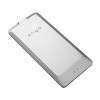- Qualcomm Launches Snapdragon 4 Gen 2 Mobile Platform
- AMD Launches Ryzen PRO 7000 Series Mobile & Desktop Platform
- Intel Launches Sleek Single-Slot Arc Pro A60 Workstation Graphics Card
- NVIDIA Announces Latest Ada Lovelace Additions: GeForce RTX 4060 Ti & RTX 4060
- Maxon Redshift With AMD Radeon GPU Rendering Support Now Available
OCZ Enyo 128GB USB 3.0 Portable SSD

“Fast”. It’s a word that can be explained in a billion different ways, but one of my favorites is to talk about the potential of OCZ’s Enyo SSD. As a portable drive, it delivers mind-blowing performance, at up to 200MB/s for both the read and write, and as an added perk, it’s small, stylish, and priced surprisingly well.
Page 2 – Test System & Methodology; Iometer & HD Tune Pro
For most of our performance-type content, we hold nothing back when explaining our methodologies and beliefs. But as this is simply an external storage review, we don’t feel there’s quite as important a need to do that. If you’ve read our other performance content, you already know how seriously we take our testing practises, as it’s obvious that coming up with an accurate end score for any benchmark is very important. In the case of flash drives, we repeat all tests at least twice to verify that our results are accurate.
|
Component
|
Model
|
| Processor |
Intel Core i7-965 Extreme Edition – Quad-Core, 3.20GHz, 1.30v
|
| Motherboard |
Gigabyte GA-X58A-UD5 (Rev 1.0) – X58-based, F5 BIOS
|
| Memory |
Kingston HyperX – 12GB DDR3-1333 7-7-7-24-1T, 1.60v
|
| Graphics | EVGA GeForce GTX 285 1GB – GeForce 197.45 |
| Audio |
On-Board Audio
|
| Storage | |
| Power Supply | |
| Chassis | |
| Display |
Dell 24" 2408WFP
|
| Cooling | |
| Et cetera |
For our real-world transfer tests, the source files are stored on Intel’s X25-M G1 solid-state disk, which avails us a top-end read speed of around 250MB/s. Unless the USB device we’re testing with is able to write in excess of that, there should be no bottleneck.
Iometer 2006.07.27
To start things off, we’re using Iometer, a popular storage benchmarking application that’s as effective as it is customizable. It’s for both of those reasons that we choose to use it, and also thanks to the fact that it’s capable of outputting the results to both MB/s and IOPS (in/out operations per second). The latter is the value we focus on, as it’s become a standard for measuring performance in enterprise/IT environments.
Admittedly, running this test on most USB flash drives, especially 2.0 models, is not entirely important given the typical manner they’re used, but it’s our goal to see where one excels over another when dealing with such an intensive test. IOPS performance would be very important if you were to install an OS on a flash drive, as long as the bandwidth throughput is also good.



Well, it’s clear that things are off to a great start for the Enyo. When I first benchmarked Super Talent’s drive last month, the IOPS performance was outstanding compared to what we were used to seeing with USB 2.0 devices, but the Enyo in every test simply blew that drive out of the water.
You might notice that our Enyo 2.0 IOPS performance saw a significant drop, and I attribute that to the fact that I conducted a lot of brutal testing on the drive before performing that testing. I’ll talk more about the reasons for this on page four.
HD Tune Pro 3.5
One of the simplest methods for testing storage is with HD Tune, and as it’s able to give reliable and repeatable results, we like using it in our testing. Although the program offers a good range of testing methods, we use the basic test that gives us read speeds and also access latencies.


OCZ’s drive had parallelled IOPS performance, but where HD Tune is concerned, Super Talent’s drive manages to be just a little bit faster. In the real-world, differences this minor would be difficult, if not impossible, to notice. The Enyo does become the first USB 3.0 device we’ve tested to see a 0.1 ms seek time, though.
PCMark Vantage
One of the more popular storage benchmarks currently is Futuremark’s PCMark Vantage. Even though this is a suite designed to benchmark your entire machine, it’s HDD suite test is quite robust and is good at delivering scores that scale well with the storage device you are benchmarking. Almost all of the storage companies we deal with regularly recommend using it, so we do.

The results here are interesting, and almost surprising. Both the Enyo and SuperCrypt drives posted almost the exact same results across USB 3.0 and 2.0. The Enyo did manage to pull ahead, but only by just a bit. As we receive more USB 3.0 devices to benchmark with, it will be interesting to see if we’re going to see a drive achieve a higher score than that, or see if we’ve hit some sort of ceiling.
Support our efforts! With ad revenue at an all-time low for written websites, we're relying more than ever on reader support to help us continue putting so much effort into this type of content. You can support us by becoming a Patron, or by using our Amazon shopping affiliate links listed through our articles. Thanks for your support!





